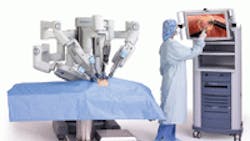It's fitting that Intuitive Surgical Inc. is headquartered in Sunnyvale, Calif., in the heart of Silicon Valley. The maker of the da Vinci robot-assisted surgical system is approaching $1.5 billion in annual revenue with a total workforce of fewer than 1,600 people. Approximately 320 of them are involved in the company's manufacturing operations, according to Augusto "Gus" Castello, Intuitive's senior vice president for product operations.
That's "a remarkably low headcount" for a product manufacturer, asserts Castello -- especially one whose flagship product requires 10,000 discrete components and more than 1 million lines of software code.
"Most manufacturing companies that are considered to be very profitable, or at least using their resources in an effective way, probably generate about $300,000 to $350,000 of revenue per employee," Castello says. "And here we're at almost $1 million of revenue per head. It's the sort of ratio that software companies have."
It's the sort of ratio achieved by a company with a high level of self-awareness. Intuitive Surgical knows what its core competence is -- developing robotic technologies for minimally invasive surgical procedures -- which is why "on the manufacturing side of the business, we are very focused on innovation, and supporting innovation," Castello explains.
"Our goal in manufacturing is to enable [the company] to introduce very innovative products for minimally invasive robotic procedures in record time," Castello says. "That's the only way that we believe that we're going to stay ahead of the competition."
"We don't want to be leapfrogged," Castello says. "We want it to always be ahead of what the competition might throw at us, from both a product-feature standpoint as well from a cost-benefit standpoint to the hospital."
With time to market so critical to the company's business model, Castello explains that manufacturing "will bend over backwards" to introduce a product on schedule, even if "the price or the cost contentthe material-content cost and labor-content costand perhaps even some of the service aspects of it, might not be ideal."
"What's important is to introduce it and to get feedback from the doctor," he says. "So first and foremost the product has to be efficacious. It has to be reliable. And then we'll work through the bugs in manufacturing."
Castello makes no bones about the fact that Intuitive is a "product-driven, engineering-driven company," and the company farms out a good portion of its production to several contract manufacturers in the Bay Area. However, Intuitive performs certain key operations -- such as manufacturing of the robotic arms for the da Vinci system and final product integration and testing -- at its plant in Sunnyvale, and makes its EndoWrist surgical instruments at its high-volume, low-mix plant in Mexicali, Mexico.
"We had a lot of folks working seven days a week and weekends and evenings here just to be able to compress that [timeline] and to make sure that we have the right information available to us so we can make the decision as to whether or not this new system was ready for primetime," Castello explains.
Since hitting primetime, adoption of the da Vinci Si has been brisk. In fourth-quarter 2009, da Vinci Si sales represented 79% of Intuitive's system revenues. Sales of the da Vinci Si helped push the company's full-year revenue to $1.05 billion in 2009, up from $874.9 million in 2008.
In third-quarter 2010, Intuitive's overall revenue increased 26% year-over-year to $344 million, while net income increased 43% to $87 million. Through the first three quarters of 2010, Intuitive already had reached $1.02 billion in sales.
About the Author
Josh Cable
Former Senior Editor
Former Senior Editor Josh Cable covered innovation issues -- including trends and best practices in R&D, process improvement and product development. He also reported on the best practices of the most successful companies and executives in the world of transportation manufacturing, which encompasses the aerospace, automotive, rail and shipbuilding sectors.
Josh also led the IndustryWeek Manufacturing Hall of Fame, IW’s annual tribute to the most influential executives and thought leaders in U.S. manufacturing history.
Before joining IndustryWeek, Josh was the editor-in-chief of Penton Media’s Government Product News and Government Procurement. He also was an award-winning beat reporter for several small newspapers in Northeast Ohio.
Josh received his BFA in creative writing from Bowling Green University, and continued his professional development through course-work at Ohio University and Cuyahoga Community College.
A lifelong resident of the Buckeye State, Josh currently lives in the Tremont neighborhood of Cleveland. When the weather cooperates, you’ll find him riding his bike to work, exercising his green thumb in the backyard or playing ultimate Frisbee.
